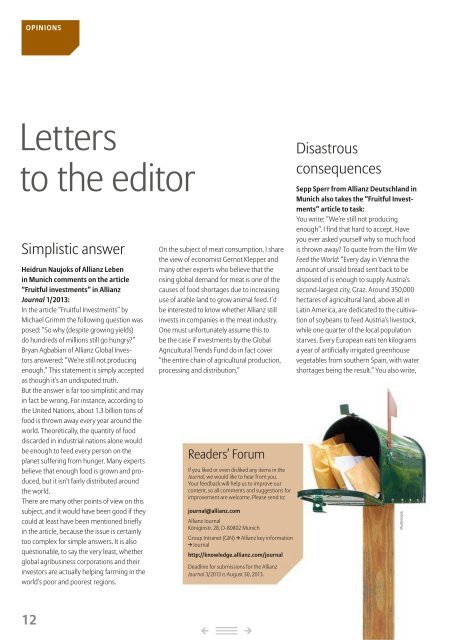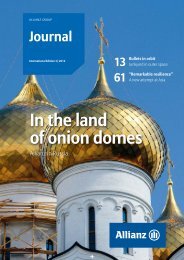Journal - Allianz
Journal - Allianz
Journal - Allianz
Create successful ePaper yourself
Turn your PDF publications into a flip-book with our unique Google optimized e-Paper software.
OPINIONS<br />
<strong>Allianz</strong> Group <strong>Journal</strong> 2/2013<br />
Letters<br />
to the editor<br />
Simplistic answer<br />
Heidrun Naujoks of <strong>Allianz</strong> Leben<br />
in Munich comments on the article<br />
“Fruitful investments” in <strong>Allianz</strong><br />
<strong>Journal</strong> 1/2013:<br />
In the article “Fruitful Investments” by<br />
Michael Grimm the following question was<br />
posed: “So why (despite growing yields)<br />
do hundreds of millions still go hungry?”<br />
Bryan Agbabian of <strong>Allianz</strong> Global Investors<br />
answered: “We’re still not producing<br />
enough.” This statement is simply accepted<br />
as though it’s an undisputed truth.<br />
But the answer is far too simplistic and may<br />
in fact be wrong. For instance, according to<br />
the United Nations, about 1.3 billion tons of<br />
food is thrown away every year around the<br />
world. Theoretically, the quantity of food<br />
discarded in industrial nations alone would<br />
be enough to feed every person on the<br />
planet suffering from hunger. Many experts<br />
believe that enough food is grown and produced,<br />
but it isn’t fairly distributed around<br />
the world.<br />
There are many other points of view on this<br />
subject, and it would have been good if they<br />
could at least have been mentioned briefly<br />
in the article, because the issue is certainly<br />
too complex for simple answers. It is also<br />
questionable, to say the very least, whether<br />
global agribusiness corporations and their<br />
investors are actually helping farming in the<br />
world’s poor and poorest regions.<br />
On the subject of meat consumption, I share<br />
the view of economist Gernot Klepper and<br />
many other experts who believe that the<br />
rising global demand for meat is one of the<br />
causes of food shortages due to increasing<br />
use of arable land to grow animal feed. I’d<br />
be interested to know whether <strong>Allianz</strong> still<br />
invests in companies in the meat industry.<br />
One must unfortunately assume this to<br />
be the case if investments by the Global<br />
Agricultural Trends Fund do in fact cover<br />
“the entire chain of agricultural production,<br />
processing and distribution.”<br />
Readers’ Forum<br />
If you liked or even disliked any items in the<br />
<strong>Journal</strong>, we would like to hear from you.<br />
Your feedback will help us to improve our<br />
content, so all comments and suggestions for<br />
improvement are welcome. Please send to:<br />
journal@allianz.com<br />
<strong>Allianz</strong> <strong>Journal</strong><br />
Königinstr. 28, D-80802 Munich<br />
Group Intranet (GIN) → <strong>Allianz</strong> key information<br />
→ <strong>Journal</strong><br />
http://knowledge.allianz.com/journal<br />
Deadline for submissions for the <strong>Allianz</strong><br />
<strong>Journal</strong> 3/2013 is August 30, 2013.<br />
Disastrous<br />
consequences<br />
Sepp Sperr from <strong>Allianz</strong> Deutschland in<br />
Munich also takes the “Fruitful Investments”<br />
article to task:<br />
You write: “We’re still not producing<br />
enough”. I find that hard to accept. Have<br />
you ever asked yourself why so much food<br />
is thrown away? To quote from the film We<br />
Feed the World: “Every day in Vienna the<br />
amount of unsold bread sent back to be<br />
disposed of is enough to supply Austria’s<br />
second-largest city, Graz. Around 350,000<br />
hectares of agricultural land, above all in<br />
Latin America, are dedicated to the cultivation<br />
of soybeans to feed Austria’s livestock,<br />
while one quarter of the local population<br />
starves. Every European eats ten kilograms<br />
a year of artificially irrigated greenhouse<br />
vegetables from southern Spain, with water<br />
shortages being the result.” You also write,<br />
Shutterstock<br />
“Our fund invests in companies that help<br />
boost productivity.” However, you don’t write<br />
– presumably intentionally – in which regions<br />
food production is increased by those<br />
companies.<br />
Nor do I share your view that biofuel production<br />
has little impact on prices. Quite apart<br />
from the fact that biofuel is extremely bad<br />
for the environment (as a result of clearing<br />
rainforests, for example), the conversion<br />
of basic foodstuffs into fuel increases the<br />
demand for these commodities, thus increasing<br />
prices, which poor countries can<br />
then no longer afford. Rich farmers who<br />
can produce surpluses prefer to sell their<br />
food to rich countries and make a fat profit<br />
in the process, so there’s even less to eat in<br />
poor countries. Poor farmers, by contrast,<br />
are barely able to produce enough to feed<br />
themselves and have to buy the expensive<br />
food that they can’t afford.<br />
I do agree that the situation can be remedied<br />
only by taking an ecological approach<br />
to farming, not by increasing the use of fertilizers.<br />
Fertilizer, after all, is generally used<br />
only where there’s already enough to eat<br />
or where farmers export their produce (for<br />
instance, soybeans from Brazil). And that<br />
has disastrous consequences.<br />
More than<br />
financial support<br />
Linda Murphy of <strong>Allianz</strong> Global Corporate<br />
& Specialty in Los Angeles on the<br />
cooperation of <strong>Allianz</strong> and MyHandicap:<br />
Recently, a family member of mine lost their<br />
leg and we have been going through months<br />
of surgery, as well as months of adapting to<br />
a new life without a leg and with wheelchairs<br />
and prosthetics. It is wonderful to see again<br />
how <strong>Allianz</strong> goes beyond just providing<br />
financial protection and support for individuals<br />
but also partners up with social initiatives<br />
that are looking to improve quality of life.<br />
We had not heard of MyHandicap and really<br />
enjoy learning about all of its benefits. The<br />
insurance products being developed will be<br />
great for handicapped people. It is very rewarding<br />
knowing that I work for a company<br />
that partners social initiatives in this way.<br />
Frustration in sales<br />
<strong>Allianz</strong> general agent Horst Frei from<br />
Mosbach in Baden-Württemberg on the<br />
interview with Karsten Crede of <strong>Allianz</strong><br />
Global Automotive entitled “The future<br />
is inconceivable without cars” in <strong>Allianz</strong><br />
<strong>Journal</strong> 1/2013:<br />
I can understand that <strong>Allianz</strong> would like<br />
to expand its Global Automotive business<br />
but why this article has appeared in <strong>Allianz</strong><br />
<strong>Journal</strong> is a complete mystery to me. My colleagues<br />
and I make a living selling insurance.<br />
Now we’ve got competition from our own<br />
company again. We’ve just sustained two<br />
years of substantial premium adjustments.<br />
Many clients have left us because they were<br />
annoyed about their premiums.<br />
At the same time, the designated CEO of the<br />
newly founded VW Insurance (under the<br />
aegis of <strong>Allianz</strong>!) was quoted in the press as<br />
saying: “There’s still room to lower prices<br />
further”. And this comes from an insurer that<br />
is already significantly cheaper and can offer<br />
better services than the <strong>Allianz</strong> agent around<br />
the corner.<br />
Surely an article of this nature will encourage<br />
exclusivity sales enormously. I don’t expect<br />
every article in the <strong>Allianz</strong> <strong>Journal</strong> to make<br />
me dance for joy. However, a little more sensitivity<br />
would be welcome to prevent even<br />
more frustration in sales.<br />
“Many roads lead<br />
to Rome”<br />
Axel Steinhoff of <strong>Allianz</strong> Beratungsund<br />
Vertriebs-AG in Munich comments<br />
on the interview with Dieter Wemmer<br />
and Manuel Bauer on the subject of<br />
corporate culture:<br />
In his interview with Manuel Bauer and<br />
Dieter Wemmer, Frank Stern asked how<br />
different value systems and cultures affect<br />
management behavior and management<br />
culture, but in my opinion the answer he<br />
received was just one side of the coin. To<br />
me the answer was more a comment on<br />
the development status of another value<br />
system from a German point of view. It<br />
focused on the impact of German (management)<br />
behavior in the countries mentioned,<br />
for instance in the sense of a different way of<br />
communicating or exchanging information.<br />
However, as I understand it, the question<br />
was really about the impact of other value<br />
systems and cultures on management behavior<br />
in general, for example, on the behavior<br />
of managers here in our country. From<br />
my own experience I would say that we<br />
should not underestimate the importance<br />
of accepting and respecting other cultures,<br />
values and communication systems, as well<br />
as their application in the context of our own<br />
system or guidelines.<br />
In my view, the effect of such interaction<br />
with foreign cultures lies in a more enriching<br />
and healthy reflection of our management<br />
behavior, helping us to become tolerant and<br />
open-minded here to the many roads that<br />
lead to Rome.<br />
12<br />
<br />
<br />
<br />
<br />
13










